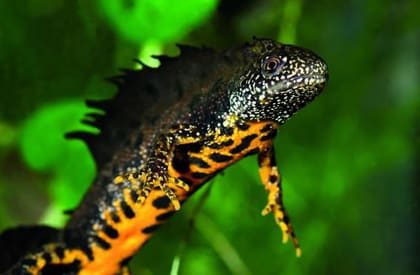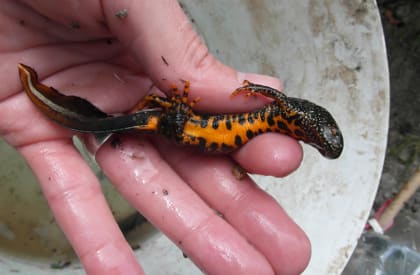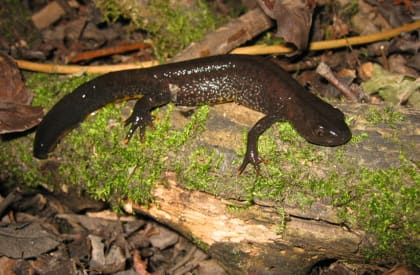

Great crested newts (GCN) are a European protected species. Individual newts, their eggs, and habitats used for breeding and shelter are legally protected.
GCN are found in aquatic and terrestrial habitats including ponds, ditches, rough grassland (including allotments), hedgerows, woodland, scrub, log piles and gardens.
They begin to congregate in breeding ponds from late February, leaving again between May and July. They forage and hibernate in terrestrial habitats, taking refuge in places which are protected from frosts and flooding.
GCN surveys will be needed if:
- there are suitable GCN habitats on the site;
- distribution and historical records suggest newts may be present; and
- there’s a pond within 500 metres of the development, even if it only holds water some of the year
An initial survey method for GCN includes assessing the Habitat Suitability Index (HSI) of ponds to measure their suitability to support GCN. If ponds are suitable, further survey is needed between March and June. This may include:
- Bottle-trapping – leaving partially submerged bottle traps in ponds overnight, checking for presence of newts the following morning
- Egg searching – checking submerged vegetation for GCN eggs. Substitute ‘egg strips’ can be used if vegetation is lacking in ponds
- Torch survey – detecting presence of GCN using torches at night
- Hand-netting – capturing newts within ponds to confirm presence
- Environmental DNA testing of pond water to detect presence of GCN
Other than DNA testing, which requires only one set of samples to be taken during the survey period, a minimum of four site visits using at least three other recognised survey methods (including at least two visits between mid-April and mid-May) is required to determine the presence/absence of newts in ponds. Six surveys (at least three visits between mid-April and mid-May) are required to make a population size assessment – required for mitigation and licensing. Survey of terrestrial habitat includes pitfall trapping and looking under refugia. Surveys are dependent on weather conditions and timing.
Key Benefits of Service

- We hold GCN survey licences and can undertake all of the survey techniques
- We can react promptly to avoid costly delays, as surveys are seasonally restricted
- We are experienced in mitigation design and pond management
